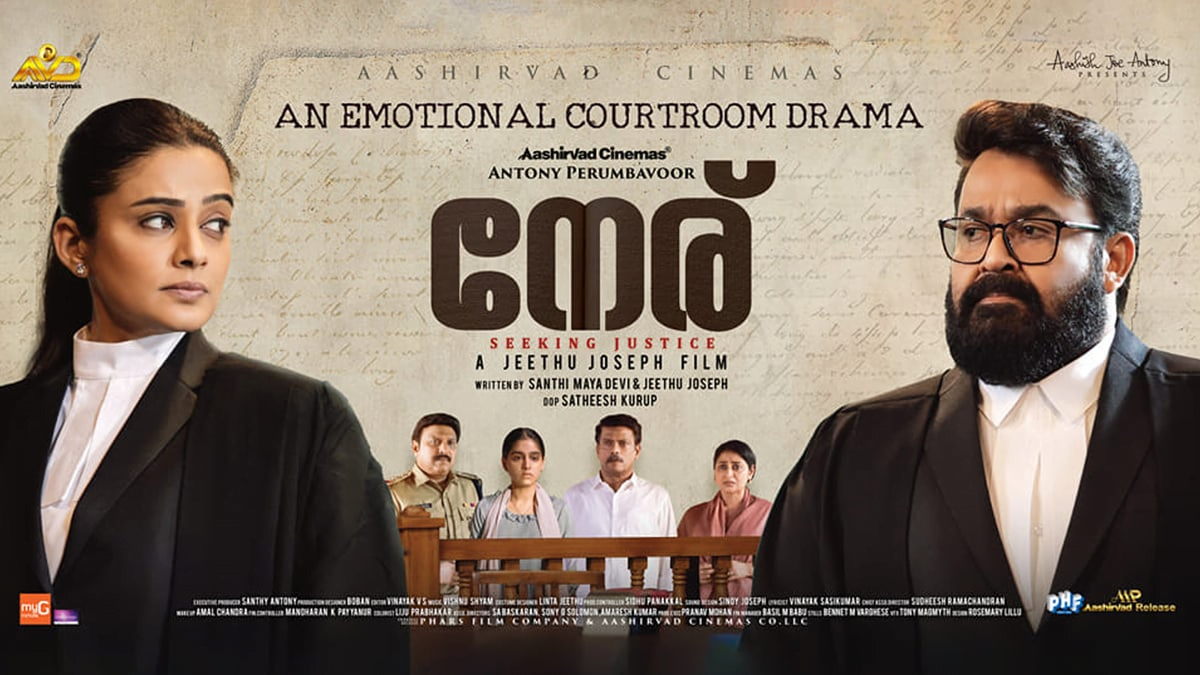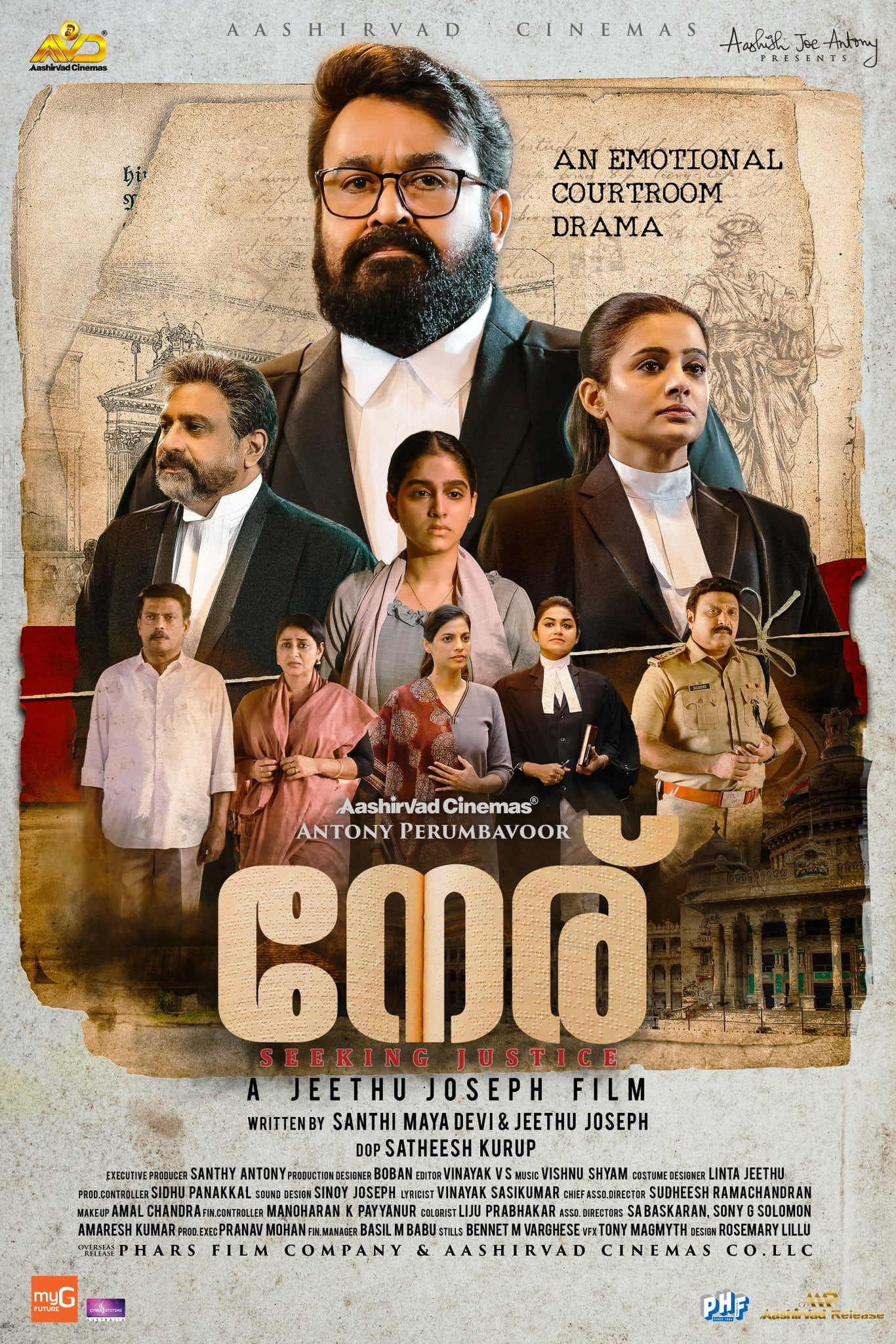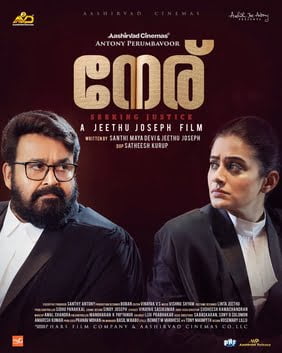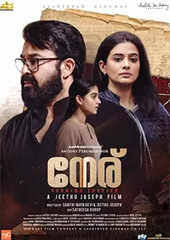Of the innumerable genres of cinema, courtrooms dramas usually are considered to be “boring”. When the same settings, row of lawyers, blast of the usual legal terminologies are followed by the contest between black and white, it never provides a space for freshness. While it is also true that the tables can be turned when the courtroom drama is handled by the right director and scriptwriter, this could also lead to the most excruciating moments for the audience. Jeethu Joseph’s Neru (2023), the title of which literally translates to ‘the truth’, a Malayalam film rolling from December 2023 is such a one. Within a month’s time, Neru has received attention from critics and amassed wide theatre responses.
Within a month’s time, Neru has received attention from critics and amassed wide theatre responses.
Neru was jointly scripted by Santhi Mayadevi and Jeethu Joseph and acted by a host of talented actors like Mohan Lal, Anaswara Rajan, Siddique, Jagadish, etc. The film focuses on the rape of a blind teenager, Sara played by Anaswara Rajan and her fight for justice, surpassing her blindness. The theme is pitted against the backdrop of the legal procedures and the system followed in the country that requires the victim to submit solid evidences against the culprit, even when the culprit is known to be the offender to many people.
Sara as the voice of rape victims in Neru
The role of Sara is different from many other characters from similar films in the fact that she tries to fight to the maximum, with her disability. She has adapted to her blindness and thus she has mastered ways to lead a “normal” way of life. Therefore, she strongly believes that she deserves justice just like anyone else in her situation whereas, before law she is a disabled character who is thought to be not capable enough to identify the culprit who has wronged her.
The way she pleads with Vijaya Mohan melts him and he tries not to destroy her hopes. Her charisma and talents extend to the court as well. Her strong dialogues to protect her integrity and hence of all rape victims stands out from the rest. When advocate Rajashekar bluntly questions her in court to destroy her spirit and reasoning, though at first, she gives in, Vijaya Mohan’s support gives her the courage to speak out her mind and defend her acts. In a significant dialogue, she reasons that, it is the victim’s attempt to prevent death that is seen by many as her enjoying rape or coming up with false accusations.
Her dialogue makes viewers see how the strength of sexual violence survivors is far more powerful than patriarchal diktats which encourage modesty and silence in crucial situations. In the country’s culture context where modesty is valued more than the life of women, such messages positively impact the Indian consciousness. The role played by Sara’s family is also crucial- her step-father Mohammed and mother have understood her trauma and thus, they are ready to undergo anything to give her solace. Yet another important message shared is the need to empower all children irrespective of their disabilities since it can help to comfort, nourish or rescue them in the most vulnerable times like the one that Sara faces.
The character of Sara played by Anaswara Vijayan has nailed it like many of her other characters.
The character of Sara played by Anaswara Vijayan has nailed it like many of her other characters. Her self blending into Sara has foregrounded her from the rest of the crew, even ousting Mohan Lal. He appears as an aid to her, through whom she could pass her emotions and trauma to the audience. Thus, she has made him into a passage to her self, both through acting and the making of the script.
The Vijaya Mohan and Rajashekar duo in Neru
Apart from the story, the main action that happens is in the courtroom between Rajashekar and Vijaya Mohan, both of whom have a shared history. Vijaya Mohan being a straight forward man had not taken up the case to beat Rajashekar whereas the latter utilises this opportunity to discredit and wound him again.
The timely toned dialogue delivery of Vijaya Mohan brought to life by the veteran actor Mohan Lal against the crude and balanced presentation of Rajashekhar played by Siddique adds innumerable crucial moments in the court. Character wise, Vijaya Mohan rises above his contemporaries, including Rajashekhar, due to his greater presence of mind and unaffected air. He focuses more on the source than the problem. Thus, he could presume the actions and plan of his rival in advance.
Many critics have called Neru as the return of Mohan Lal to form since the failure of some recently released films. It appears that Mohan Lal has almost vigilantly sought to tame Vijaya Mohan into the fabric of a common lawyer with a sense of consciousness and reason. Therefore, he blends in with the rest of the characters without his usual aura of heroism. Vijaya Mohan is found amidst the log of books at his house, usually. He advocates for Sara and becomes homogenous with the rest of the lawyers at the success of Sara.
The legal bindings of the nation as shown in Neru
In a nation like ours, where still the fight against rape and for sexual abuse victims is on, Neru is a call to renew our views in favor of the victims. At the same time, it exhibits how sometimes power influences court proceedings as in the film when the public prosecutor acts in favor of the defence lawyer, hence they had to replace him with Vijaya Mohan.
The legal procedures that are followed in the nation follows a system that grants a leeway for the accused. This system is thoroughly criticised in the film. The system requires the victim to submit as much strong evidence as possible to make the court decide about the accused. No evidence based on circumstance alone can be used to ground these cases. This system though framed with the ulterior that no innocent person should be punished can sometimes go out of hand to favor and justify the culprit. In the film Mohammed’s depressed words signify this dilemma and the angst of a father.
Through the climax, Neru has managed to bring to the forefront an atmosphere where timely catharsis and a sense of justice fills the air. Especially the two scenes towards the end with Sara sculpting three faces and walking out add to this. The former represents her act of recording the devil, the devil’s advocate and Michael in her life for the world to see while her waling out celebrates the accusations and trauma freeing her soul and body. Sara affirms that it is her task to hide her face and also, there is nothing for her to be afraid of in this nation. She boldly represents all those who had, have and still struggle to find justice.
Altogether, the film is must watch courtroom thriller, jointly penned by a female scriptwriter, Santhi Mayadevi.
Altogether, the film is a must watch courtroom thriller, jointly penned by a female scriptwriter, Santhi Mayadevi. The 152 minute film without doubt integrates the feelings and emotions of the audience who at the very end feels that Sara’s victory is their victory too.
About the author(s)
Vidhu (she/her) is an emerging writer with Masters in English language and literature, keen on learning the politics of the world around her. She has dreams to create a career in journalism and writing, where she unburdens her self. She has a great taste for movies from varies geographical spans and pens down poetry in magical charms. She is open to projects or research centring on humanities.








